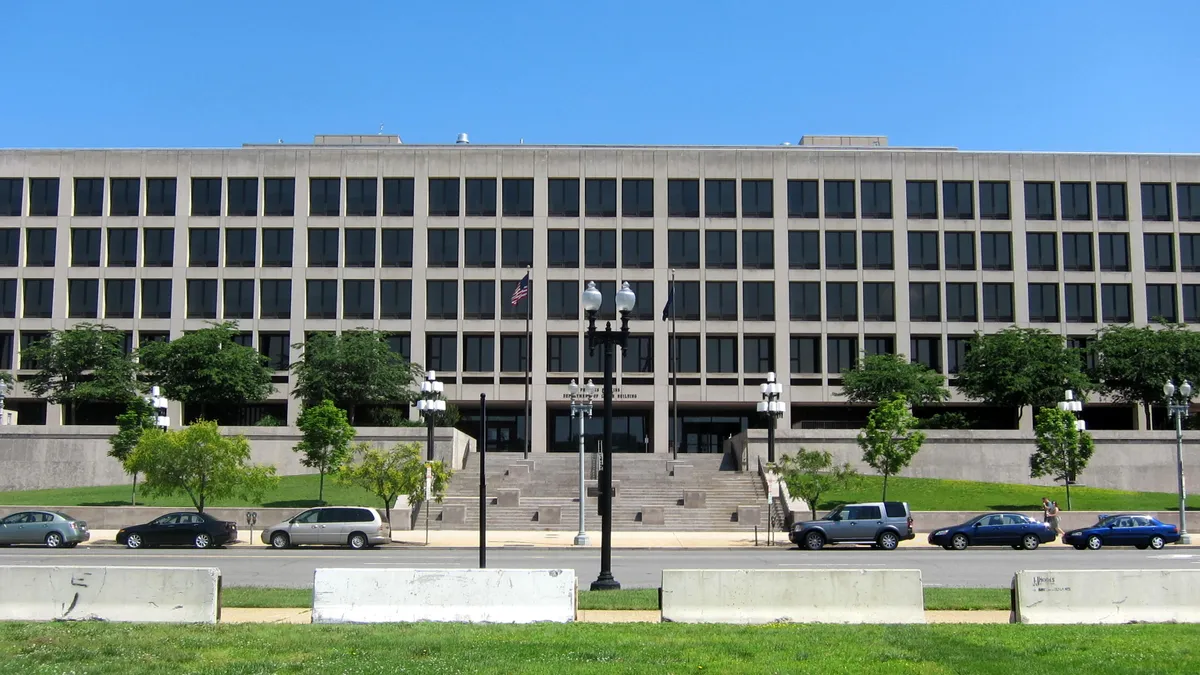Dive Brief:
- Employers paid "close to $4 million" to more than 3,500 employees last year to resolve Families First Coronavirus Response Act (FFCRA) violations alleged by the U.S. Department of Labor (DOL), Helen Applewhaite, director of DOL's Division of FMLA and Other Acts, said during the 2021 DMEC Virtual Compliance Conference March 3.
- In total, Applewhaite said the agency conducted more than 4,200 FFCRA investigations and continues to enforce the law's emergency paid leave requirements for the effective period, which ended Dec. 31, 2020. She added that DOL continues to do virtual presentations on COVID-19 and its impacts on the workforce and will do so "for whatever period of time in order to reach the people we need to reach."
- Applewhaite said that other department initiatives have continued, including DOL's Request for Information on paid leave programs and the Family Medical and Leave Act. The agency received "about 100" comments from stakeholders on the RFI and "is still looking at those," Applewhaite said.
Dive Insight:
Much of Applewhaite's presentation discussed the wide-ranging, sometimes overnight changes DOL made during the initial months of the pandemic. She noted that the agency's website, which typically received 500,000 visitors per week prior to the pandemic, saw more than 6 million visitors in a single week last year.
She described the process of implementing FFCRA regulations as "intense" and "unprecedented." Staff performed online presentations and outreach, with investigators answering "hundreds of thousands" of phone calls and providing technical assistance. DOL published regs implementing the FFCRA without the opportunity to gather public comments and feedback.
"To say that we published regulations in two weeks — it still kind of chills me every time I say that," Applewhaite said. "It's just not done."
During the temporary non-enforcement period instituted following the FFCRA's enactment, DOL took a compliance assistance approach, Applewhaite said; "If we had a complaint, we would contact the employer, provide information needed for compliance, and if we gained agreement to comply and the issues were remedied immediately we didn't pursue further." But DOL did take a more "vigorous" approach "if we didn't find a willing employer," she noted.
As a result of legislation passed in December 2020, employers were not required to provide paid leave via the FFCRA beyond the end of the year, but they may continue to do so on a voluntary basis in exchange for a tax credit through March 31, 2021. In his American Rescue Plan document, President Joe Biden called on Congress to strengthen and extend the FFCRA's mandatory paid leave provisions through Sept. 30, 2021.
However, that provision does not appear in the version of H.R. 1319 — also known as the American Rescue Plan Act of 2021 — the Senate passed March 6. The bill would instead establish a tax credit for employers that voluntarily provide paid leave between April 1, 2021 and Sept. 30, 2021. In addition to the qualifying reasons for taking such leave described in the FFCRA, the tax credit would also apply to leave taken to receive a COVID-19 vaccination or to recover from any injury, disability, illness or condition related to receiving a COVID-19 vaccine.
DOL continues to publish FAQ-based guidance on its website as well as field assistance bulletins that allow employers to see how DOL will approach enforcement, Applewhaite said, adding that last year's experience showed how the agency can adapt to the needs of the U.S. workforce; "We can be far more flexible than we ever thought possible."














